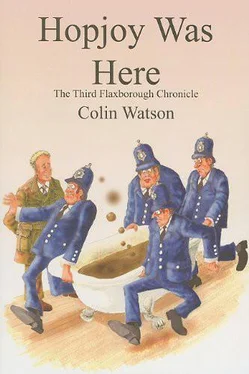At the hour when Purbright drove into the great concrete forecourt of the Neptune (his earlier reference to it as a ‘yard’ had been in deference to the Chief Constable’s known contempt for the modern conceits of the licensing trade) the entowered automaton was not working. He was able to appreciate, however, the other, only slightly less impressive features of the building: the dawn-pink façade pointed with black asterisks, the candy-striped sun awnings, the sculpted representation of nude nymphs playing leapfrog before the main entrance itself—a shallow but wide portico framing two immense concave plates of heavy glass, counter-sprung to yield to the touch of the most diffident venturer into high life.
Purbright parked the rather shabby police car beside half a dozen much grander vehicles already standing in the forecourt. One of them, he noticed, bore the number plate which had been identified by a Brockleston constable—presumably the florid-faced youngster in uniform whom Purbright spotted in an attitude of assumed and unconvincing nonchalance against the far wall of the court.
Gently elbowing open one of the glass plates, Purbright crossed a quarter-acre of bottle-green carpet to the reception counter. Beyond and seemingly below this formidable rampart sat a girl whose shoulders moved with the rhythm of knitting. At the inspector’s approach, she raised a small, melancholy and mistrustful face.
“Yes?” She glanced back at her needles.
“I should like a word with the manager if he’s available.”
“Mr Barraclough?” The girl seemed not to deem Purbright worth a second look.
“Yes, if that’s his name.”
“I’ll see if he’s in.” She knitted on to the end of the row, thrust the wool into some recess below the counter, and rose. Purbright was a little startled by the revelation of silk-encased thighs. The girl’s costume, evidently intended to transform her into a stimulating replica of an American night club attendant, proved in fact a bizarre detraction from whatever charm she might have had. As she walked indolently to a door at the end of the counter her flesh wobbled within the incongruous tights with as much sexual provocation as a blancmange on a waiter’s trolley.
Purbright turned and gazed gloomily round the big empty reception hall, shadowlessly aglow with the light from orange opalescent panels in the ceiling. There were three tall doors, black and thinly striped with gold and pierced with clear glass portholes, set in each of the side walls; they led, he supposed, to bars and lounges. The hall funnelled gently at its opposite end to a broad staircase. The apparent absence of a lift puzzled Purbright at first. Then a plunging purr of deceleration drew his eye to what he had taken to be a round supporting pillar in the very centre of the hall. It split and opened like the rind of some Arabian Nights fruit and disgorged a tubby man with a professional smile and rather a lot of cuff. As he walked briskly towards Purbright he gave the curious impression of paddling himself along on his elbows. He stopped just short of a collision. “Sar!”
Purbright raised his eyebrows and glanced from the man to the stalagmite lift shaft. “The genie of the lamp?”
The man’s smile remained tightly screwed on, but the rest of his facial furniture shifted slightly; he obviously did not care for levity. “Or Mr Barraclough, rather,” Purbright corrected himself.
The manager nodded and rested one hand on the counter, behind which the leggy receptionist had silently reappeared.
Purbright handed him a card. “I should like,” he said, “to verify the presence in your hotel of a gentleman who may be able to help me with a few inquiries.”
“One of the staff?”
“I think it more likely that he is among your guests, sir.”
The manager’s momentary expression of anxiety faded. At that time of year customers were much more readily expendable than employees. He turned to the girl. “The register, please, Dorabel.”
“There is one minor complication,” said Purbright. “I do not precisely know the man’s name”—Barraclough shrugged and seemed about to countermand his request for the register—“but never mind, I can give you the choice of two.”
The manager’s suspicion deepened that this tall, smart-aleck policeman was making faintly menacing jokes as a prelude to extorting an offer of free drink. He ran through quickly in his mind those most recent instances of malfeasance at the Neptune which might conceivably have come to the notice of authority.
“I hope,” he said, taking an opulently bound volume from the arms of Dorabel, “that these inquiries of yours won’t cause trouble of any kind. Mistakes aren’t too easy to put right once they’re made.” That part of his brain that had been sifting the possible reasons for the inspector’s arrival struck suddenly upon a lantern lecture given the previous Wednesday night in one of the private lounges to a Flaxborough Chamber of Trade party. A slide discovered among the bottles the next morning and brought to him by a distressed chambermaid had suggested a somewhat liberal exposition of the lecture’s theme, ‘Commercial Deviations in the Near East’.
“Perhaps you’d better come along to my office,” said Barraclough. He picked up the register and led Purbright through one of the black doors, a short way along a corridor and into a relatively austere cubicle that contained a filing cabinet, an untidy, old-fashioned desk and a stack of cartons of cigarettes. He reached towards a bellpush. “You’ll have a little refreshment, inspector?”
“That’s kind of you, sir, but I don’t really feel in need of any at the moment.”
To Barraclough such apparently eccentric asceticism was confirmative of even more serious matters being afoot than he had been able so far to imagine. He meekly invited Purbright to a chair and opened the register. “Those two names?” he prompted.
“One of them is Hopjoy.”
Barraclough looked up sharply. “What’s he been up to?”
“You know Mr Hopjoy, then?”
“He’s spent quite a bit of...time here. On and off, you know.” The information was delivered cautiously.
“A good spender? Other than of time.”
“We’ve always valued his custom, certainly. In this business one has to be accommodating on the odd occasion, of course. Mr Hopjoy has excellent credentials. Naturally, I cannot divulge them, but I dare say they’d surprise you.”
Purbright recognized the nervous loyalty of a creditor. “Do you happen to know,” he asked, “Mr Hopjoy’s occupation?”
For a moment, the manager hesitated. Then discretion won. “He’s an agent for some big manufacturing firm. An excellent position, I understand.”
“Is he staying here now, sir?”
Barraclough did not refer to the register. “Not at the moment, he isn’t. We haven’t seen him for a few days. I should explain that he is not in the way of being a regular resident. Just the odd night—when he happens to be covering this district, I suppose.”
“Mr Hopjoy’s car is outside now.”
Barraclough looked only faintly surprised. “Yes? Well, I’m not absolutely certain about this but I should say it’s on loan to a friend of his. I believe they do share it to some extent.” He paused, then asked, almost hopefully, Purbright thought: “It is the car that these inquiries of yours are about?”
The inspector shrugged. “Not primarily; though cars do tend to figure in all sorts of investigations these days—they’re becoming our second skins, aren’t they? No, it’s the driver I really want to see. I presume he’s a Mr Periam.”
“Mr Periam is staying here.”
“Do you know for how long?”
“Another week, I believe.”
Читать дальше

![Fredrik Backman - Britt-Marie Was Here [Britt-Marie var här]](/books/61260/fredrik-backman-britt-marie-was-here-britt-thumb.webp)










